Lebanon and Iraq in 2019 Revolutionary uprisings against ‘sectarian neoliberalism’
In October 2019, Lebanon and Iraq once again came under the spotlight. The famous 2011 chant al-sha’b yureed isqāt al-niẓām (The people want to topple the regime) echoed again in new protests across both countries. Iraq and Lebanon officially entered the second wave of Arab Uprisings that had started to unfold in late 2018, beginning with Sudan and Algeria. These simultaneous waves of mass protests in Lebanon and Iraq were not new.
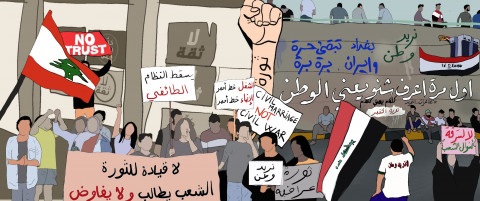
Fourate Chahal El Rekaby
Lebanon and Iraq’s October 2019 uprisings have their roots in previous cycles of concomitant – albeit separate – mass mobilizations, which reached a peak in 2015. On 16 July 2015 protesters assembled in the city of Basra in southern Iraq to demonstrate against power cuts, contaminated water, youth unemployment and corruption. During the demonstration, 18-year-old protester Muntaẓar al-Hilfi was killed. This spurred a wave of mass protests1 that quickly spread across the country, reaching the capital Baghdad, with thousands of people chanting the famous slogan Bismil deen baguna al-haramiyy2 (In the name of religion the thieves have robbed us). A day later, on 17 July 2015, some 1,215 kilometres away, residents of the city of Naameh in southern Lebanon blocked the road leading to the main landfill site in the country, due to a garbage crisis that was polluting most of Beirut and Mount Lebanon. As in Iraq, the protests quickly spread to the capital, Beirut, where thousands of protesters gathered in Martyrs’ Square chanting Kellon ya’ne kellon (All of them means all of them), in a clear condemnation and rejection of all sectarian leaders.
These simultaneous waves of mass protests in Lebanon and Iraq were not new.3 In both countries, the year 2011 had formed a turning point, with mass protests erupting in the context of the Arab Uprisings. But the 2015 mobilizations marked an important juncture in the history of collective action against the regimes in Iraq and Lebanon: so-called ‘civil society’ campaigns were formed, and ran for municipal and parliamentary elections.
In October 2019, Lebanon and Iraq once again came under the spotlight. The famous 2011 chant al-sha’b yureed isqāt al-niẓām (The people want to topple the regime) echoed again in new protests across both countries. Iraq and Lebanon officially entered the second wave of Arab Uprisings that had started to unfold in late 2018, beginning with Sudan and Algeria.
What do Iraq and Lebanon have in common beyond a regional/cultural proximity? They are both governed by a political and economic regime that can be best described as ‘sectarian neoliberalism’, a peculiar mix of identity-based power-sharing, known as consociational democracy, and a fierce neoliberal economic system that relies heavily on rent, financial capitalism, and the deregulation of labour markets. In this context, the uprisings in Lebanon and Iraq were targeting the complex state structure in each country. At the same time, unlike other Arab countries, the regimes in both countries do not have one clear ‘head’ that can be toppled; rather, multiple sectarian leaders thrive through religious ideology or practices of sectarian clientelism and nepotism, and derive their political power from their allegiance to regional powers, such as Iran and Saudi Arabia. This geopolitical set-up, in addition to the legacy of sectarian violence and the rampant socioeconomic and environmental crises, led Lebanon and Iraq to erupt in 2019. In both countries, these new uprisings were quickly dubbed thawra (revolution) – and marked a new chapter in their histories.
The October 2019 uprisings started initially with mobilizations around socioeconomic and governance issues. In Lebanon, following a week of wildfires which ravaged several parts of the country, and in the context of an unfolding financial crisis, the government’s decision to introduce new taxes on 17 October – including the infamous WhatsApp tax – served as the spark that ignited this new thawra. In a similar vein, the Iraqi thawra erupted following two main events in late September 2019: the mobilization of unemployed university graduates, and the demotion of General Abdul Wahab al-Saadi, a well-respected lieutenant general who had played a key role in defeating Islamic State (Isis). With anger growing against the Iraqi government, calls for protests on 1 October marked the start of what has been called Thawrat Tishreen (the October Revolution). In both Iraq and Lebanon, the protesters managed to oust the Prime Minister, and caused a political deadlock that the regimes then tried to deal with through the formation of a so-called ‘technocratic’ government. Unfortunately, in both countries, this massive revolutionary wave was halted by the global COVID-19 pandemic and rapid financial deterioration.
The following discussion is divided into three parts. The first discusses whether these uprisings were ‘revolutions’ or ‘revolutionary’ in the first place. The second focuses on the internal contradictions of these revolutions, looking at the rhetoric of corruption, national unity, technocratic politics and individualism. Finally, the third part discusses the shift from the utopia and high hopes of late 2019 to the dystopia and pessimism of early 2020, with the arrival of COVID-19 and the deepening of the financial and political crises.
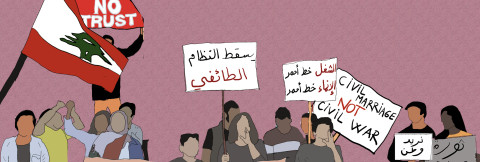
Illustration by Fourate Chahal El Rekaby
Revolution, revolutionary, or not? Rethinking our conceptual toolbox
The one-word chant Thawra, thawra (Revolution, revolution) filled the squares and the streets of most cities in Lebanon and Iraq in October 2019, when hundreds of thousands took to the streets to declare the start of what they saw as a revolution. The clarity of that liminal moment convinced people that what they were witnessing was revolutionary. However, pundits did not all agree with this description, with many adopting a more sceptical position. The debate that erupted in 2011 around the accuracy of the term ‘revolution’ in reference to the events then unfolding in the Arab region resurfaced once more in 2019. During the first wave of uprisings, some scholars and intellectuals warned us that these were not revolutions but merely revolts, upheavals, uprisings or ‘refolutions’. Others declared these events ‘revolutions without revolutionaries’.4 It might be true that these events do not fall under the traditional definition of ‘revolutions’ found in social movement literature; however, it is important to think of them in terms of revolutionary processes,5 rather than as events that either succeed or fail.
It is also important to take into account the temporal aspect that governs the definition of revolutions. Revolutions are often referred to as such only in retrospect, once they have succeeded in overthrowing a ruling class or regime. This process can take years, if not decades, and frequently fails. Even the most celebrated revolutions did not unfold without cycles of ebbs and flows, and were decades in the making. For example, the widely celebrated French Revolution took around eight decades, and several rounds of conflict and counter-revolution, before the First Republic was established. Even the Russian Revolution of 1917 can be understood as a broader political process that started in 1905 and that had several episodes before the final blow was struck against the tsarist regime in 1917. Therefore, in thinking about the events of October 2019 in Lebanon and Iraq as revolutionary uprisings our theoretical and conceptual toolbox needs to be updated to make room for ‘finding the revolutionary in the revolution’.6 Hence, it is important not to dismiss or downplay the role of these experiences as long-term processes shaping and transforming the political imaginaries of people in their everyday lives.
It is this utopian and revolutionary potential of seeking and imagining an alternative – beyond sectarian, dictatorial or capitalist realism – that needs to be centred in our understanding of these historical moments. After all, sociologist Jeffrey Paige was right to say that ‘revolution has a future even if many theoretical definitions of revolution do not’.7 In that sense, we should not get bogged down in the highly normative, fixed and sometimes misplaced debates about whether these are revolutions or not; and more importantly we should surely not shy away from adopting the term ‘revolutionary’ in referring to the historical developments in Lebanon or Iraq since 2019. By using the words ‘revolution’ and ‘revolutionary’ we will, first, be honouring the experiences of millions who believed in the revolutionary potential of the moment in question, who themselves called the events a ‘revolution’, and who considered themselves to be revolutionaries – even if it was just for a short moment. Moreover, we will also be pushing for a theoretical rethinking of the meaning and form of revolution under twenty-first century neoliberal capitalism more broadly. This is therefore not a call to move away from theoretical debates about what revolutions constitute, but rather to rethink our conceptual toolbox and adapt it to the realities of the twenty-first century neoliberal era. This is particularly important in the case of Lebanon and Iraq, as it can help us to understand how these revolutionary moments had considerable internal contradictions: rejecting the sectarian-neoliberal system while at times also adopting its discursive and ideological pillars (as discussed in the next section).
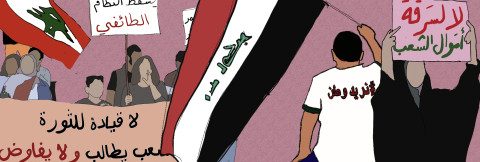
Illustration by Fourate Chahal El Rekaby
Fighting sectarian neoliberalism with its liberal political culture?
Revolutionary moments are often imbued with contradictory features and dynamics. Thus, it is possible for people to fight against sectarian neoliberalism while also adopting its main liberal clichés and slogans. A closer look at the 2019 revolutions in Lebanon and Iraq reveals such contradictions. Does the discourse of nationalism and ‘co-existence’ necessarily imply a condemnation of sectarianism? Is the problem one of corruption per se or of neoliberal capitalism? Can technocratic political demands be revolutionary? Can individualism and a rights-based approach pave the way for a revolution, or are these reformist approaches that serve to reproduce a status quo? In what follows, these trends will be scrutinized, especially in terms of how they reflect the remnants of a political culture fostered by decades of sectarian capitalism.
Nationalism versus sectarianism?
Waving the national flag and singing the national anthem were common, and sometimes predominant, in public squares across Lebanon and Iraq in 2019. This fixation on the Lebanese or Iraqi national identity as a way to express a rejection of sectarian and ethnic divisions, and to highlight ‘co-existence’ and ‘national unity’, was not new or exceptional. The focus on a national identity and patriotism has been observed in many other countries (such as Algeria and Egypt) where the national question remains central in shaping the political imaginaries of revolutionaries. In other countries, such as Syria and Libya, protesters adopted the modified independence flag to mark a rupture with the dictatorial regimes (of the Baʿth Party and of Muammar Gaddafi) and their associated flags. This play on the relationship between the flag, the national anthem and the regime has unfolded in most squares and streets across the Arab region since 2011.
In Lebanon and Iraq, though, protesters have often adopted a nationalist approach not in order to express the legacy of a national struggle, pride in a strong nation, or a rejection of a certain flag associated with the regime, but rather to illustrate their quest to establish a genuine nation, through their attempts to overcome sectarian divisions. However, is nationalism necessarily the opposite of sectarianism? Decades of literature on sectarianism and nationalism show that these two phenomena are often two sides of the same coin. In Lebanon and Iraq, nationalism has often been deployed with a sectarian connotation, in contrast to many national liberation struggles, in which nationalism represented a political ideology that was in opposition to colonization or occupation. The history of the region provides a nuanced account in this regard. To give two examples: Arab nationalism has historically been associated with Sunni overtones; and Lebanese nationalism has often entailed a Christian connotation. However, it remains common for ordinary members of society to use a nationalist discourse in order to signal their rejection of sectarianism. Seen in this light we can say that the uprisings in both Iraq and Lebanon have clearly attempted to address the question of sectarianism through raising the demand of an “imagined nation” as a remedy for the problems the countries face.
In Iraq’s 2019 uprising, the main slogans in the squares were ‘The people want to overthrow the regime’ (the famous chant of the 2011 protests across the Arab region), and Nreed watan (We want a homeland). This was coupled with chants and banners denouncing sectarianism and asserting the fraternity between Iraqi Sunnis and Shias. By demanding a ‘homeland’8 and rejecting sectarianism, the protesters were signalling a desire for a modern state that would be able to serve its citizens and provide a sense of belonging beyond sectarian and ethnic fragmentation.
In Lebanon, a similar process of re-imagining the ‘nation’ beyond sectarian fragmentation was observed. Squares quickly filled with the national flag, and the Lebanese anthem was repeatedly heard on loud speakers. While the main slogans also included the famous ‘The people want to overthrow the regime’, a more custom-made slogan was added: Kellon ya’ne kellon (All of them means all of them), signalling a rejection of the sectarian power-sharing system and denouncing all leaders, regardless of their sectarian belonging. Like in Iraq, the rejection of political sectarianism was expressed through a desire to get rid of all sectarian leaders and to build a ‘country’, a ‘state’, and a ‘nation’ that will protect its citizens and treat them equally and justly.
However, sectarianism was not the only problem that needed to be tackled in the two countries: a dire economic situation also loomed over the scene. Therefore, the discourse of national unity and co-existence was coupled with slogans about the economic situation, often in the form of ‘anti-corruption’ rhetoric.
Corruption or sectarian neoliberalism?
A trend that appeared in both revolutions, and that seemed to contradict the radical side of the moment, was the predominance of a liberal discourse around ‘corruption’. Of course, corruption is a major problem in Lebanon and Iraq. However, the alarmingly high rates of youth unemployment, the deregulation of labour markets, the expansion of the informal sector, the politics of austerity, the lack of development in productive economic sectors, the heavy reliance on imports for basic needs (such as food and electricity), the debt crisis, and the reliance on financial capital (the banking sector) or oil rent are hardly the result of corruption only. These are clearly indicators of a deeper crisis in the neoliberal capitalist system that has, in the case of Lebanon and Iraq, intersected with a sectarian political system and a heavy militarization of some political parties to create a sort of ‘mafia state’, where ruling elites have acted to ensure the state and its spoils serve their economic interests and those of the business and banking cronies that sustain them.
The flourishing of such an oligarchy that controls the state and uses it for its own benefits, shielded from accountability or the rule of law, has allowed for patronage networks and the politics of clientelism to strive and shape what has been called the ‘politics of non-state welfare’.9 In this context, revolutionaries in the streets of Lebanon and Iraq who were protesting unemployment or financial crisis were also – even if indirectly – protesting neoliberal capitalism and its local version of neoliberal sectarianism. However, the protesters’ framing remained mainly fixated on anti-corruption, and did not address the structure of the economic system. More and more, the crisis was reduced to the corruption of a few ‘bad leaders’ who needed to be replaced by better and more ethical technocrats. Shaped by an NGO lingo of anti-corruption that fails to tackle capitalism as a root cause, this trend obscured the more radical drive of the first few days of the protests, which called for the complete overhaul of the system, rather than merely the replacement of corrupt politicians.
Seen from this perspective, the major challenge for the uprisings in Iraq and Lebanon now is to move beyond liberal politics and simultaneously to re-target the struggle more precisely against the two pillars of the sectarian-neoliberal regime: keeping the focus on the demand for socioeconomic justice beyond neoliberal capitalism, while also rejecting the intertwined system of sectarian power-sharing and identity politics.
Technocratic politics and leaderlessness
The popular demand for a technocratic government that emerged in the aftermath of the resignation of the prime ministers of Lebanon and Iraq became a life vest for the two regimes. How did the protesters that wanted to uproot the whole system end up demanding from the regimes to form technocratic governments?
This third contradiction in the 2019 uprisings in Lebanon and Iraq revealed itself in the schism between the radical demands of a complete overhaul, on one side, and the widespread celebrations of leaderlessness and technocratic political demands, on the other side. Given the state of affairs in both countries, political organization and political leadership came to be equated by wide sections of society with corruption and criminality. A new generation had grown to perceive party politics as bad, and to distance itself from political organization or leadership aspirations. For most people, being patriotic and honest meant staying away from politics. This ‘anti-politics’ approach, although rooted in an aversion to conventional politics, translated in many cases into a rejection of all types of organizing or leadership. This resulted in a deep contradiction during the initial days of the uprisings, when the popular will to oust the regimes was at its highest, while the popular capacity to provide a political alternative was clearly weak. This crisis of political organization led the masses to raise demands that at times sounded anarchist (rejecting any rule or leadership), and at others liberal (the demand for the formation of a technocratic government).
Here again the demands fell short of addressing the radical and revolutionary potential of the moment. This situation needs to be understood as a consequence of the weakness of leftist political organization and the cooptation of unions and syndicates. The revolutionary fervour was thus guided by political trends that diluted the revolutionary political path, instead of strengthening it. Unlike in Sudan or Tunisia, where unions and leftist organizations managed to scaffold the initial revolutionary moment (despite the later counter-revolutionary developments), the revolutions in Lebanon and Iraq erupted at a time when such organizations were too weak to lead the way.
Given the weakness of unions in both countries, road blockades were a widely used tactic to indirectly bring the country to a halt, thus imposing a de facto general strike. The imposed closure of businesses and institutions allowed for huge crowds to mobilize in the streets and created a revolutionary moment. Similarly, the student movements played a crucial role in sustaining the uprisings in both Lebanon and Iraq, through their calls for strikes and mobilization. However, despite the huge collective efforts of hundreds of thousands who gave their best to ensure the success of this revolutionary moment, the lack of organization and leadership, and the decades of de-politicization and NGO-ization in Lebanon since the early 1990s, and in Iraq since 2003, created a political ceiling for the uprisings that was much lower than the popular aspirations that animated them.
My revolution or ours? In search of a collective ‘we’
The articulations and changing dynamics of the uprisings in Iraq and Lebanon remind us that neoliberalism is more than a question of financial structures: it is also an ideological manifestation. Hence, the contradiction between the collectiveness of the revolutionary moment and the individualism of the political framings that emerged from the collective action are emblematic of the neoliberal age. This was noticeable in how some of the major political initiatives during this period were largely framed by an individual subjective outlook. For example, a key electoral campaign that grew out of the 2015 mobilizations in Lebanon, and that was active in the 2019 uprising, was Beirut Madinati (Beirut, my city). Instead of emphasizing a collective ‘our’ that rethinks the city as a shared space for all, the name emphasizes an individual relationship with the city. Similarly, in the aftermath of the financial collapse in 2019, activists in the Lebanese uprising sprayed graffiti on the windows of banks, saying ‘Give me back my money’ – not ‘Give us back our money’. While the collective anger against the banks was clear, the political culture that shaped the activism of this period was still a product of the very system it was fighting against.
Many campaigns also emphasized a legal and rights-based approach that seems to be detached from the realities of both Lebanon and Iraq. In both countries, the post-war sectarian-neoliberal setting flourished in the context of a weakening of the legal and judicial systems. The language of ‘rights’ therefore does not occupy a central space in the political imaginaries of people who have learned not to trust the legal pathway. However, several prominent political movements and campaigns have centred individual ‘rights’ as the locus of their activism. Examples include the political campaign that ignited the uprising in Iraq under the slogan Nazel akhod haqqi (I am mobilizing to take my right), and the political group Li maqqi (For my right) that was very active in the Lebanese uprising.
This emphasis on individual rights in political organizations and campaigns speaks to the longing for an imagined state where the rule of law is respected. However, as suggested earlier, the pervasiveness of a neoliberal culture that enshrines individualism and individual rights seems to be at odds with the progressive politics of collectiveness embodied in the revolutions’ squares – even if only for a short time.
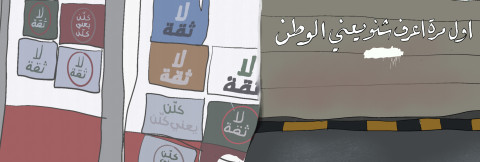
Illustration by Fourate Chahal El Rekaby
From utopia to dystopia: liminality, COVID-19, and counter-revolution
‘We did not want to sleep because the dream we were living while awake was much nicer.’
This is how the experience of living the early days of the 2019 thawra was described by a young man from the Chouf-Aley region of Mount Lebanon. The liminal10 experience of revolution as a dream-like feeling of ‘temporal limbo’11 or a stark break from the previous ‘normal’ led the protesters to believe that this was a moment that was full of possibilities. The rapid transformations in people’s everyday lived experiences in Lebanon and Iraq, and the spontaneous emergence of a ‘communitas’, where togetherness and comradeship reigned in the squares, was hard to miss in the early days of the revolution. Cooperation and camaraderie, meetings in tents, public political discussions, and a festive mood shaped life in the squares. However, this was disrupted by the heavy violence and repression of state apparatuses and their connected militias. While the repression backfired at first, leading more people to mobilize in outrage at the targeting of protesters, by the end of 2019 the revolution in both countries had started to enter a deadlock, with a lack of political alternatives, an inability to continue the strikes, and a repositioning of the regimes after the initial shock they had received in October 2019.
As 2020 started, a series of highly exceptional circumstances aligned to halt the revolutionary process: a global pandemic, a deep financial collapse, and, in Lebanon, the massive explosion at the port of Beirut, which shattered both the city and its inhabitants. These outside circumstances were added to the cooptation and counter-revolutionary wave that had deepened by the end of 2019. The formation of technocratic governments became the ancien régimes’ way to continue governing, despite the difficulty of this task after October 2019 in both countries.
However, the arrival of the COVID-19 pandemic in the region came not only as a public health threat, but also as a counter-revolutionary turn of events. The squares were forcibly emptied and street mobilizations were halted. The state used the opportunity to crack down on dissent under the pretext of preserving public health. It became difficult to sustain the uprisings, despite the deepening of the political and economic crises. The sudden move from the intense communal experience of the revolution to the intense isolation of COVID lockdowns led to a general feeling of defeat.
The utopia of the early revolutionary days was quickly overshadowed by the dystopia of the pandemic and what followed. The downward spiral of both countries into economic misery made the possibilities of organizing more difficult. In Lebanon, the Beirut port explosion of 4 August 2020, described as the third biggest non-nuclear explosion in history, devastated the city and led to a massive wave of migration out of the country. Furthermore, a series of political assassinations in Iraq, and to a lesser extent in Lebanon, underlined that political opposition carried with it a real threat of death at any moment. However, now that the pandemic is starting to recede, and as the political deadlock and financial crises are deepening, the revolutionary processes that started in Lebanon and Iraq in October 2019 are bound to continue, albeit in new shapes and forms.
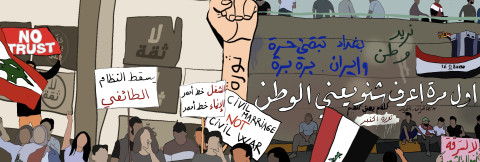
Illustration by Fourate Chahal El Rekaby
Conclusion
This article has argued that the revolutionary uprisings of October 2019 in Lebanon and Iraq can only be read as part of a broader revolutionary process that started to unfold in 2011, and that intensified in both countries in 2015, before reaching the eruption point of 2019 as part of the second wave of uprisings in the region. While these uprisings might not fall under traditional definitions of revolutions – since they have not overthrown the regime as a whole – it is important to think of them as part of a revolutionary process. This is not only because we should avoid limiting revolutions to temporal events or qualifying them as political dichotomies (in which they either succeed or fail), but also because it is crucial to rethink the meaning and shapes of revolution under twenty-first century neoliberal capitalism globally.
The article has discussed the internal contradictions that characterized the uprisings in Lebanon and Iraq in 2019, with the dominance of a liberal discourse of national co-existence, anti-corruption, individual rights and technocratic politics that fell short of the radical potential of the initial moment of eruption. The analysis has suggested that one important consequence of the sectarian-neoliberal system that governs both countries, and that therefore favours individual interlocutors, has been the weakness of political organizations or trade unions: in other words, the structures that could serve as a scaffold supporting the transition to a new political system. Such organizations are also needed to challenge the two-pole regimes in the two countries, where sectarianism and neoliberalism feed into each other to reproduce more of the same.
With the recent spread of COVID-19 in both countries, the emergence and organization of a lost ‘we’ is a priority in order to defeat a system that is clearly unable to protect society, either from economic disasters or from health pandemics. New forms of organizing, whether in the workplace or at the neighbourhood level, and organizations that bring together the unemployed, migrant workers, domestic workers and informal workers, are all crucial in order to build a stronger movement that can move beyond sectarian neoliberalism as both an economic structure and an ideological apparatus that shapes our political imagination and delimits our political possibilities.
It is only by linking our struggles together, within our societies and across the colonial boundaries of the nation-state, that these revolutionary uprisings can prevail. Thus, it is by standing in solidarity with Palestine, supporting Amazon workers in the US, and defending the rights of refugees and migrant workers or the ambitions of the feminist movement, that the Lebanese and Iraqi uprisings will reach their full revolutionary potential, both ideologically and politically, beyond sectarian neoliberalism.